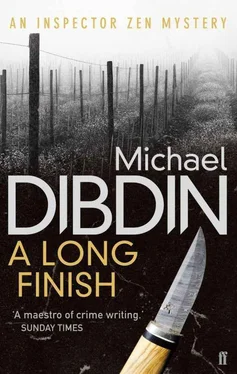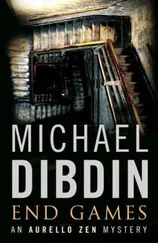Michael Dibdin - A long finish
Здесь есть возможность читать онлайн «Michael Dibdin - A long finish» весь текст электронной книги совершенно бесплатно (целиком полную версию без сокращений). В некоторых случаях можно слушать аудио, скачать через торрент в формате fb2 и присутствует краткое содержание. Жанр: Полицейский детектив, на английском языке. Описание произведения, (предисловие) а так же отзывы посетителей доступны на портале библиотеки ЛибКат.
- Название:A long finish
- Автор:
- Жанр:
- Год:неизвестен
- ISBN:нет данных
- Рейтинг книги:5 / 5. Голосов: 1
-
Избранное:Добавить в избранное
- Отзывы:
-
Ваша оценка:
- 100
- 1
- 2
- 3
- 4
- 5
A long finish: краткое содержание, описание и аннотация
Предлагаем к чтению аннотацию, описание, краткое содержание или предисловие (зависит от того, что написал сам автор книги «A long finish»). Если вы не нашли необходимую информацию о книге — напишите в комментариях, мы постараемся отыскать её.
A long finish — читать онлайн бесплатно полную книгу (весь текст) целиком
Ниже представлен текст книги, разбитый по страницам. Система сохранения места последней прочитанной страницы, позволяет с удобством читать онлайн бесплатно книгу «A long finish», без необходимости каждый раз заново искать на чём Вы остановились. Поставьте закладку, и сможете в любой момент перейти на страницу, на которой закончили чтение.
Интервал:
Закладка:
Angelin had kept digging away, scratching and sniffing, until he had opened up a gash about a foot wide in the soft earth at the foot of one of the trees. Finally he unearthed a filthy lump of something that might have been bone or chalk, shaved a corner off and presented it impaled on the tip of his knife.
‘White diamond!’ he whispered, as pathetically eager for praise as a truffle hound for the stale crust of bread with which it would be fobbed off after doing the same work.
It was then that they heard the sound of the convoy in the distance, engines revving as they climbed over the col leading up from the valley of the Tanaro. Later, of course, there’d been no time to explain. There were the trucks to turn around, and cartons of documents and records from the Questura in Alba to unload and reload, together with whatever arms and ammunition they could strip off the escort. They’d left Angelin’s body where it was. There was clearly nothing to be done for him. Nor was there any way of identifying the bullet which had passed through the back of his skull and buried itself somewhere in the mulch. They all knew that bullets could ricochet in all kinds of crazy ways. Above all, they knew that the sound of gunfire must have been heard over a wide area, and that an enemy detachment would be coming to investigate very soon.
He did not return to the site of the ambush until the following year. By then the war was over and its victims had started to take on the marmoreal, exemplary status of martyrs and mythic heroes. At the bend in the road where Angelin died — but on the other side, as though he’d been part of the main action — a plinth had been erected, bearing his name, a date and the words: ‘Here he fell for Italy beneath the lead of a barbaric enemy’. A faded wreath in the national colours garlanded the stone tablet. Angelin’s ex-comrade had read the inscription without the slightest flicker of expression. Then, making sure no one was watching, he climbed down into the woods below and commenced his excavations.
For several years it continued like this. Some seasons he got a heavy yield, others little or nothing. Truffles were like that: capricious, female and unpredictable. It was part of their considerable mystique. Lacking the late Angelin’s nose for their pungent scent — no doubt nature’s compensation for his deficiencies in other respects — he used a tabui, one of the carefully bred and trained mongrels which have the ability to home in on any example of tuber magnatum Pico within a ten-metre radius.
The lode which Angelin had discovered on this unregarded strip of wasteland at the edge of the Vincenzo property was not his only hunting ground, but returns during the early years had still been modest. He kept a few of the smaller tubers for his own use, and sold the rest either to middle-men in the informal market held every morning in the back streets of Alba, or directly to a variety of restaurants and local connoisseurs. Considering that the outlay consisted only of his time, which was of no value, the returns were reasonable. Along with some casual labour, part-time haulage and odd jobs in the handyman line, it added up to a modest living.
Then, imperceptibly at first, things started to change. One of the first signs — and the most serious, from his point of view — was the barbed wire fence which Aldo Vincenzo had erected around his property. The local wines were beginning to acquire a reputation, and with it a price, exceeding anything previously heard of, and the grapes which produced them became correspondingly precious. There was even talk of Aldo Vincenzo emulating the example of some other local producers by sending his son, Manlio, to study something called ‘viticulture’, which struck most of the community as an absurdity akin to enrolling the boy at university to teach him the facts of life.
At about the same time as wines of the Langhe started acquiring their international reputation, coincidentally creating difficulties of access to his secret hoard of white truffles, the market for the latter took off in an even more dramatic and indeed literal sense. Since truffles lose their savour after a few days, most of the harvest had previously been consumed locally, with just a small quantity being exported by rail to hotels and restaurants in other regions of Italy, as well as a handful in Austria, France and Switzerland. Then came the era of air cargo. ‘White diamond!’ Angelin had said, but that proverbial metaphor was soon out of date. Ounce for ounce, la trifola made uncut diamond look cheap. International buyers vied with one another to obtain the precious tubers and ship them off to eager consumers in London, New York and Tokyo.
It was a world market, but the supply was strictly local. Some unexplored Russian hillside or Cambodian valley might perhaps hide similar riches, but white truffles could not be cultivated, and for now the only source of any importance was a small area of southern Piedmont centred on the town of Alba. Prices went through the roof, and the trifolai became even more reticent about the exact location of their favoured sites. Angelin’s discovery thus became of still greater value. No one ever suspected that this slice of forgotten copse at the margins of the Vincenzo territory might be a mine for the white diamonds so much in demand. Like the hillside which the Faigano brothers later leased to the media for a small fortune, it had fallen off the map.
But if anyone saw him digging there, or noticed that the barbed-wire fence designed to protect the vines had been cut, all this would rapidly change. That was why he had not come during the hours of darkness, the traditional season of the ‘phantoms of the night’, as truffle hunters were known. At night he would have had to bring a torch, which might easily have been seen. People around here were naturally curious. Everything happened according to a time-honoured order and sense. Any exception was a potentially interesting anomaly to be noted and passed on to others. Hence the indirect route which he had chosen to approach the spot, the care he took not to be seen, and above all his timing.
The evening before had seen the Festa della Vendemmia, celebrated annually at Palazzuole on the first Saturday in October. The date of the vintage itself varied from year to year and from vineyard to vineyard, depending on the weather and the degree of risk which any given grower was prepared to accept in return for the possibility of riper fruit. But the date of the village festa was invariable, as were the excesses and rituals associated with it. On the Saturday everyone ate and drank and danced and drank and flirted and drank and reminisced and drank, and then grew maudlin and nostalgic and lyrical. The entire community stayed up until well after midnight, slept in late the next morning and then reluctantly hauled themselves out of bed, clutching their hangovers like cerebral cysts, and staggered to church to attend the service invoking divine blessing on the event on which virtually all of their livelihoods depended in one way or another.
So as he picked his way up the muddy alley between the two rows of vines, he knew that the chances of anyone being up and about, never mind vigilant and suspicious, in the misty half-light before sunrise on that particular Sunday morning were as close to zero as made no difference. And while he had put in an appearance at the celebrations the day before — not to do so would inevitably attract comment — he had made a few glasses of wine go a lot further than it had appeared, and had woken fresh and alert at five o’clock that morning, ready for his annual, but very private, ceremony.
He thought of this as ‘laying flowers on Angelin’s tomb’, even though the supposed victim of a barbaric enemy was not, of course, buried at the spot where he had been killed. The flowers were real, though: a touchingly artless bouquet of white chrysanthemums he had bought the day before in full view of several witnesses. He had told them that the flowers were for his mother, but with an awkward shrug which both ended the conversation and would be remembered in the event of his being caught and asked the reason for his presence on the Vincenzo land that morning. ‘I just wanted to honour my fallen comrade,’ he would say, his voice breaking with long-denied emotion. ‘People called him simple, but to me he was a friend…’
Читать дальшеИнтервал:
Закладка:
Похожие книги на «A long finish»
Представляем Вашему вниманию похожие книги на «A long finish» списком для выбора. Мы отобрали схожую по названию и смыслу литературу в надежде предоставить читателям больше вариантов отыскать новые, интересные, ещё непрочитанные произведения.
Обсуждение, отзывы о книге «A long finish» и просто собственные мнения читателей. Оставьте ваши комментарии, напишите, что Вы думаете о произведении, его смысле или главных героях. Укажите что конкретно понравилось, а что нет, и почему Вы так считаете.











